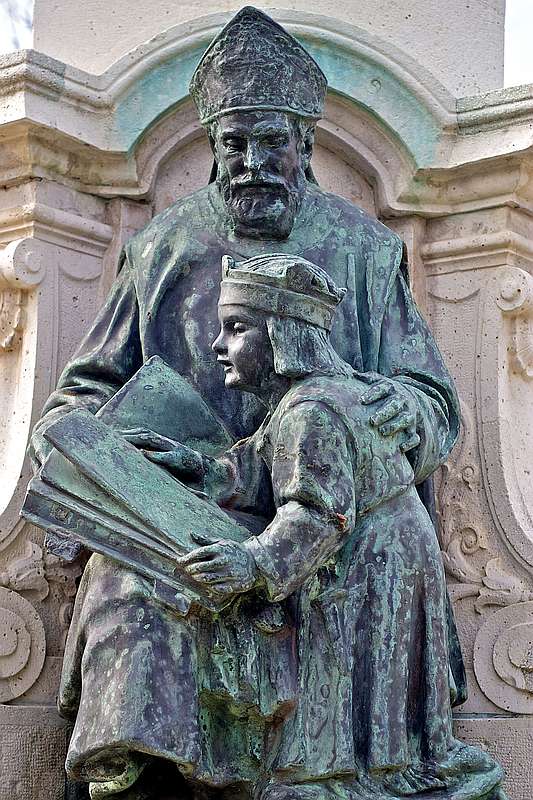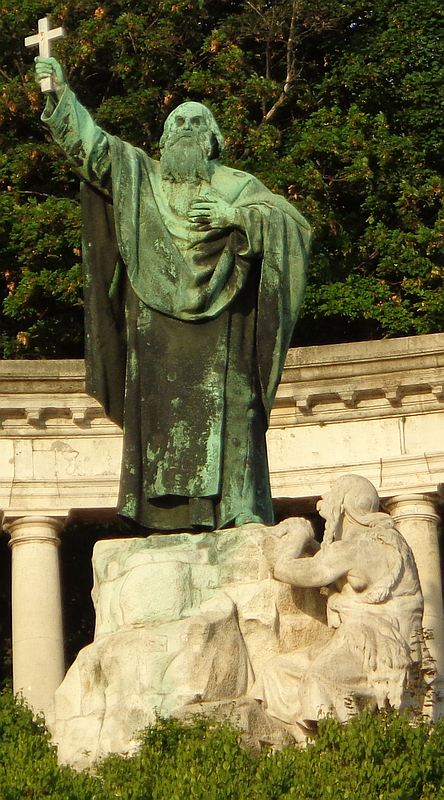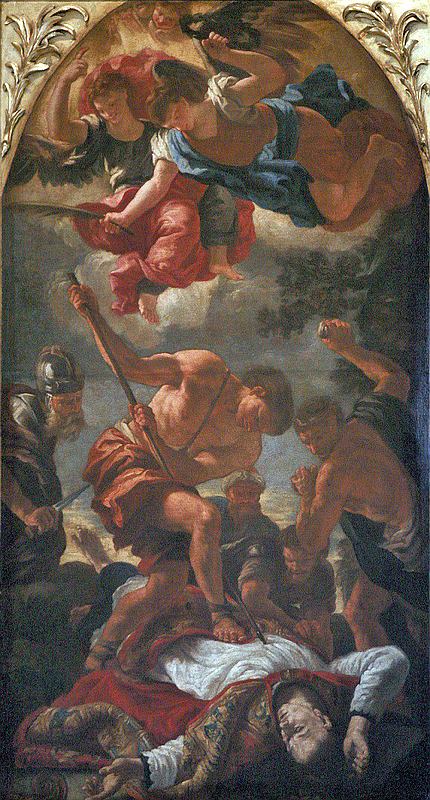Adapted from Various Sources.
St. Gerard, Bishop of Csanád, Martyr and Apostle of Hungary († 1046; Feast – September 24)
St. Gerard, the apostle of a large district in Hungary, was a Venetian, and born about the beginning of the
eleventh century. He renounced early the enjoyments of the world, forsaking family and estate to consecrate himself to
the service of God in a monastery. By taking up the yoke of Our Lord from his youth he found it light, and bore it with
constancy and joy. Walking always in the presence of God, and nourishing in his heart a spirit of tender devotion by
assiduous holy meditation and prayer, he was careful that his studies should never extinguish or impair it, or bring
any prejudice to the humility and simplicity by which he studied daily to advance in Christian perfection. After some
years, with the leave of his superiors, he undertook a pilgrimage to the Holy Sepulcher at Jerusalem.
 Passing through Hungary, he became known to the holy King St. Stephen, who was wonderfully taken with his
sincere piety, and with great earnestness persuaded him that God had only inspired him with the design of that pilgrimage,
that he might assist, by his labors, the souls of so many in that country, who were perishing in their infidelity.
Gerard, however, would by no means consent to stay at court, but built a little hermitage at Biel, where he passed
seven years with one companion called Maur, in the constant practice of fasting and prayer. The King having settled
the peace of his kingdom, drew Gerard out of his solitude, and the Saint preached the gospel with wonderful success.
(Image left – St. Gerard instructs St. Emeric, son of St. Stephen.)
Passing through Hungary, he became known to the holy King St. Stephen, who was wonderfully taken with his
sincere piety, and with great earnestness persuaded him that God had only inspired him with the design of that pilgrimage,
that he might assist, by his labors, the souls of so many in that country, who were perishing in their infidelity.
Gerard, however, would by no means consent to stay at court, but built a little hermitage at Biel, where he passed
seven years with one companion called Maur, in the constant practice of fasting and prayer. The King having settled
the peace of his kingdom, drew Gerard out of his solitude, and the Saint preached the gospel with wonderful success.
(Image left – St. Gerard instructs St. Emeric, son of St. Stephen.)
Not long after, the good prince nominated him to the episcopal See of Csanád, a city eight leagues
from Temesvár. Gerard considered nothing in this dignity but labors, crosses, and the hopes of martyrdom. The greater
part of the people were infidels, those who bore the name of Christians in this diocese were ignorant, brutish, and savage.
Two-thirds of the inhabitants of the city of Csanád were idolaters; yet the Saint, in less than a year, made them all
Christians. His labors were crowned with almost equal success in all the other parts of the diocese. The fatigues
which he underwent were excessive, and the patience with which he bore all kinds of affronts was invincible. He commonly
travelled on foot, but sometimes in a wagon: he always read or meditated on the road. He regulated everywhere all things
that belonged to the divine service with the utmost care, and was solicitous that the least exterior ceremonies should be
performed with great exactness and decency, and accompanied with a sincere spirit of religion. To this purpose he used
to say, that men, especially the grosser part (which is always the more numerous), love to be helped in their devotion
by the aid of their senses.
 The example of our Saint had a more powerful influence over the minds of the people than the most moving discourses.
He was humble, modest, mortified in all his senses, and seemed to have perfectly subdued all his passions.
This victory he gained by a strict vigilance over himself. Once finding a sudden motion to anger rising in his breast,
he immediately imposed upon himself a very severe penance, asked pardon of the person who had injured him, and heaped
upon him great favors. After spending the day in his apostolic labors, he employed part of the night in devotion,
and sometimes in cutting down wood and other such actions for the service of the poor. All distressed persons he took
under his particular care, and treated the sick with uncommon tenderness. He embraced lepers and persons afflicted
with other loathsome diseases with the greatest joy and affection; often laid them in his own bed, and had their sores
dressed in his own chamber. Such was his love of retirement, that he caused several small hermitages or cells to be
built near the towns in the different parts of his diocese, and in these he used to take up his lodging wherever he
came in his travels about his diocese, avoiding to live in cities, that, under the pretense of reposing himself in
these solitary huts, he might indulge the heavenly pleasures of prayer and holy contemplation; which gave him fresh
vigor in the discharge of his pastoral functions. He wore a rough hair shirt next to his skin, and over it a coarse
woolen coat.
The example of our Saint had a more powerful influence over the minds of the people than the most moving discourses.
He was humble, modest, mortified in all his senses, and seemed to have perfectly subdued all his passions.
This victory he gained by a strict vigilance over himself. Once finding a sudden motion to anger rising in his breast,
he immediately imposed upon himself a very severe penance, asked pardon of the person who had injured him, and heaped
upon him great favors. After spending the day in his apostolic labors, he employed part of the night in devotion,
and sometimes in cutting down wood and other such actions for the service of the poor. All distressed persons he took
under his particular care, and treated the sick with uncommon tenderness. He embraced lepers and persons afflicted
with other loathsome diseases with the greatest joy and affection; often laid them in his own bed, and had their sores
dressed in his own chamber. Such was his love of retirement, that he caused several small hermitages or cells to be
built near the towns in the different parts of his diocese, and in these he used to take up his lodging wherever he
came in his travels about his diocese, avoiding to live in cities, that, under the pretense of reposing himself in
these solitary huts, he might indulge the heavenly pleasures of prayer and holy contemplation; which gave him fresh
vigor in the discharge of his pastoral functions. He wore a rough hair shirt next to his skin, and over it a coarse
woolen coat.
The holy King St. Stephen seconded the zeal of the good Bishop as long as he lived. But that prince's nephew
and successor Peter, a debauched and cruel prince, declared himself the persecutor of our Saint: but was expelled by his
own subjects in 1042, and Abas, a nobleman of a savage disposition, was placed on the throne. This tyrant soon gave the
people reason to repent of their choice, putting to death all those noblemen whom he suspected not to have been in his
interest. St. Stephen had established a custom, that the crown should be presented to the King by some Bishop on all
great festivals. Abas gave notice to St. Gerard to come to court to perform that ceremony. The Saint, regarding the
exclusion of Peter as irregular, refused to pay the usurper that compliment, and foretold him that if he persisted in
his crime, God would soon put an end both to his life and reign. Other prelates, however, gave him the crown; but,
two years after, the very persons who had placed him on the throne turned their arms against him, treated him as a rebel,
and cut off his head on a scaffold. Peter was recalled, but two years after banished a second time. The crown was then
offered to Andrew, son of Ladislas, cousin-german to St. Stephen, upon condition that he should restore idolatry,
and extirpate the Christian religion. The ambitious prince made his army that promise. Hereupon Gerard and three other
bishops set out for Alba Regalis (now known as Székesfehérvár), in order to divert the new king from this
sacrilegious engagement.
 When the four bishops were arrived at Giod near the Danube, St. Gerard, after celebrating Mass,
said to his companions:
When the four bishops were arrived at Giod near the Danube, St. Gerard, after celebrating Mass,
said to his companions: We shall all suffer martyrdom today, except the bishop of Benetha.
They were advanced
a little further, and going to cross the Danube, when they were set upon by a party of soldiers, under the command of
Duke Vatha, the most obstinate patron of idolatry, and the implacable enemy of the memory of St. Stephen. They attacked
St. Gerard first with a shower of stones, and, exasperated at his meekness and patience, overturned his chariot,
and dragged him on the ground. Whilst in their hands the Saint raised himself on his knees, and prayed as the protomartyr
St. Stephen: Lord, lay not this to their charge; for they know not what they do.
He had scarcely spoken these
words when he was run through the body with a lance, and expired in a few minutes. Two of the other bishops,
named Bezterd and Buld, shared the glory of martyrdom with him: but the new king coming up, rescued the fourth bishop
out of the hands of the murderers. This prince afterwards repressed idolatry, was successful in his wars against the
Germans who invaded his dominions, and reigned with glory. St. Gerard's martyrdom happened on the 24th of September, 1046.
His body was first interred in a church of Our Lady near the place where he suffered; but soon after removed to the
cathedral of Csanád. He was declared a Martyr by the Pope, and his remains were taken up, and put in a rich shrine
in the reign of St. Ladislas. At length the Republic of Venice, by repeated importunate entreaties, obtained his relics
of the King of Hungary, and with great solemnity translated them to their metropolis, where they are venerated in the
Church of Our Lady of Murano (although some relics were later returned to Hungary).
The good pastor refuses no labor, and declines no danger for the good of souls. If the soil where his
lot falls be barren, and he plants and waters without increase, he never loses patience, but redoubles his earnestness
in his prayers and labors. He is equally secure of his own reward if he perseveres to the end; and can say to God,
as St. Bernard remarks: Thou, O Lord, wilt not less reward my pains, if I shall be found faithful to the end.
Zeal and tender charity give him fresh vigor, and draw floods of tears from his eyes for the souls which perish,
and for their contempt of the infinite and gracious Lord of all things. Yet his courage is never damped, nor does
he ever repine or disquiet himself. He is not authorized to curse the fig-tree which produces no fruit, but continues
to dig about it, and to dung the earth, waiting and repaying all injuries with kindness and prayers, and never weary
with renewing his endeavors.
Back to "In this Issue"
Back to Top
Back to Saints
NEW: Alphabetical Index
Contact us: smr@salvemariaregina.info
Visit also: www.marienfried.com


 Passing through Hungary, he became known to the holy King St. Stephen, who was wonderfully taken with his
sincere piety, and with great earnestness persuaded him that God had only inspired him with the design of that pilgrimage,
that he might assist, by his labors, the souls of so many in that country, who were perishing in their infidelity.
Gerard, however, would by no means consent to stay at court, but built a little hermitage at Biel, where he passed
seven years with one companion called Maur, in the constant practice of fasting and prayer. The King having settled
the peace of his kingdom, drew Gerard out of his solitude, and the Saint preached the gospel with wonderful success.
(Image left – St. Gerard instructs St. Emeric, son of St. Stephen.)
Passing through Hungary, he became known to the holy King St. Stephen, who was wonderfully taken with his
sincere piety, and with great earnestness persuaded him that God had only inspired him with the design of that pilgrimage,
that he might assist, by his labors, the souls of so many in that country, who were perishing in their infidelity.
Gerard, however, would by no means consent to stay at court, but built a little hermitage at Biel, where he passed
seven years with one companion called Maur, in the constant practice of fasting and prayer. The King having settled
the peace of his kingdom, drew Gerard out of his solitude, and the Saint preached the gospel with wonderful success.
(Image left – St. Gerard instructs St. Emeric, son of St. Stephen.) The example of our Saint had a more powerful influence over the minds of the people than the most moving discourses.
He was humble, modest, mortified in all his senses, and seemed to have perfectly subdued all his passions.
This victory he gained by a strict vigilance over himself. Once finding a sudden motion to anger rising in his breast,
he immediately imposed upon himself a very severe penance, asked pardon of the person who had injured him, and heaped
upon him great favors. After spending the day in his apostolic labors, he employed part of the night in devotion,
and sometimes in cutting down wood and other such actions for the service of the poor. All distressed persons he took
under his particular care, and treated the sick with uncommon tenderness. He embraced lepers and persons afflicted
with other loathsome diseases with the greatest joy and affection; often laid them in his own bed, and had their sores
dressed in his own chamber. Such was his love of retirement, that he caused several small hermitages or cells to be
built near the towns in the different parts of his diocese, and in these he used to take up his lodging wherever he
came in his travels about his diocese, avoiding to live in cities, that, under the pretense of reposing himself in
these solitary huts, he might indulge the heavenly pleasures of prayer and holy contemplation; which gave him fresh
vigor in the discharge of his pastoral functions. He wore a rough hair shirt next to his skin, and over it a coarse
woolen coat.
The example of our Saint had a more powerful influence over the minds of the people than the most moving discourses.
He was humble, modest, mortified in all his senses, and seemed to have perfectly subdued all his passions.
This victory he gained by a strict vigilance over himself. Once finding a sudden motion to anger rising in his breast,
he immediately imposed upon himself a very severe penance, asked pardon of the person who had injured him, and heaped
upon him great favors. After spending the day in his apostolic labors, he employed part of the night in devotion,
and sometimes in cutting down wood and other such actions for the service of the poor. All distressed persons he took
under his particular care, and treated the sick with uncommon tenderness. He embraced lepers and persons afflicted
with other loathsome diseases with the greatest joy and affection; often laid them in his own bed, and had their sores
dressed in his own chamber. Such was his love of retirement, that he caused several small hermitages or cells to be
built near the towns in the different parts of his diocese, and in these he used to take up his lodging wherever he
came in his travels about his diocese, avoiding to live in cities, that, under the pretense of reposing himself in
these solitary huts, he might indulge the heavenly pleasures of prayer and holy contemplation; which gave him fresh
vigor in the discharge of his pastoral functions. He wore a rough hair shirt next to his skin, and over it a coarse
woolen coat. When the four bishops were arrived at Giod near the Danube, St. Gerard, after celebrating Mass,
said to his companions:
When the four bishops were arrived at Giod near the Danube, St. Gerard, after celebrating Mass,
said to his companions: 